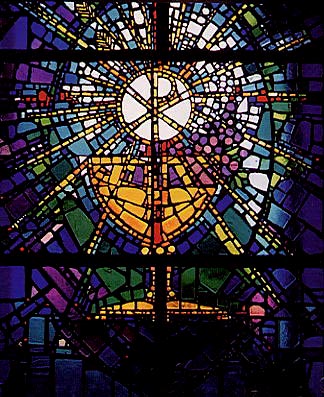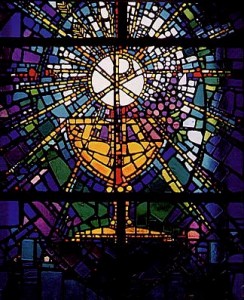Manifest Grave Sin – by Christopher Duncanson-Hales
In 2005 Canadian Member of Parliament for Timmins-James Bay was refused communion by his parish priest for his support of the controversial same-sex marriage bill, C-38. Refusing communion to public figures who choose to vote with their conscience and for the commonweal of their entire constituency and not just for the dogmatic interests of their priest or bishop is both a dangerous intervention of the church in public life and symptomatic of an increasingly tragic divide in the Roman Catholic Church.
Saint Paul University professor Catherine Clifford said it well when interviewed by Canadian Press: She said that refusal of communion is a “very serious and painful thing … it’s a form of exclusion from the community,” and used only rarely. Yet, refusal of communion is increasingly becoming the punishment of choice for perceived notorious, public sinners in the Catholic Church.
Same-sex marriage is but the latest wedge that divides Catholics. A hallmark of Roman Catholicism is its capacity to maintain unity in the face of diversity. In Canada, and through-out the world this capacity is being sorely tested. At the heart of those who seek to deny communion to Catholic politicians and public figures who do not meet the orthodoxy test would appear to be an interpretation of Canon 915, which reads:
“Those upon whom the penalty of excommunication or interdict has been imposed or declared, and others who obstinately persist in manifest grave sin, are not to be admitted to Holy Communion.”
Not admitting a politician to Holy Communion because he or she voted in favour of same-sex marriage suggests that the politician “obstinately persist[s] in manifest grave sin.” By denying public figures communion, these champions of orthodoxy appear to be upholding and defending the integrity of the Canon, the Sacrament and the Church.
While I question whether a politician’s priest or bishop is justified in denying the “spiritual riches of the Church,” especially the sacrament of Holy Communion, others are better suited to engage this debate. Suffice to say that the application of Canon 915 contradicts Canon 213 which guarantees the “right to be assisted by their pastors from the spiritual riches of the Church, especially by the word of God and the sacraments.”
I’d like to propose an alternate understanding of Canon 915 by suggesting a broader interpretation of “obstinately persist[ing] in manifest grave sin.”
The United Nations Environment Programme Global Environment Outlook 2004/2005 reports that “according to UN-HABITAT: ‘if nothing is done to check the current trend, the number of people living in slums will rise from one billion today to some 1.5 billion by the year 2020.’ This will make it difficult to achieve the Millennium Development target of significantly improving the lives of at least 100 million slum-dwellers by 2020.”
The accumulation of wealth in western, industrialized countries through unjust trade regimes engineered to benefit the few at the expense of the many is to obstinately persist in manifest grave sin.
Through-out the world, the ‘99%’ are occupying public spaces to protest and “challenge the neoliberal economic system that controls our government and destroys our communities.” (occupywallst.org/) According to UC Atlas on Inequality, “Currently, the richest 1% of people in the world receives as much as the bottom 57%. The ratio between the average income of the top 5% in the world to the bottom 5% increased from 78 to 1 in 1988 to 114 to 1 in 1993 (Milanovic 1999).”
Participating in an economic system that oppresses the many to enrich the few is to obstinately persisting in manifest grave sin.
According to the U.S. Population Resource Centre, “at the end of 2001, there were 28.1 million sub-Saharan Africans living with HIV/ AIDS. The overall prevalence of HIV among sub-Saharan African adults, ages 15 to 49 years, is estimated to be an astounding 8.4 per cent.”
Complacency in the face of the African HIV/AIDS crisis is to obstinately persist in manifest grave sin.
As winter approaches, the First Nation community of Attawapiskat on the James Bay coast is facing a housing crisis. People are living in tent shelters, converted garages, temporary trailers and plywood shacks. What housing there is, is inadequate, with black mold and multiple generations living in single family dwellings.
Ignoring the humanity of First Nations peoples, tacit complicity in national policies of assimilation and cultural genocide and the continued exploitation of First Nation’s land and resources is to obstinately persist in manifest grave sin.
In a letter to the leaders of the G8 countries, Bishop Blaise Morand, chairman of the Episcopal Commission for Social Affairs of the Canadian Conference of Catholic Bishops quoted Pope John Paul II’s World Day of Peace Message in 2000, writing that poverty is “the one issue that most challenges our human and Christian consciences.” More recently, Benedict XVI’s Post-Synodal Apostolic Exhortation AFRICAE MUNUS obliges us to render justice to all peoples:
On the social plane, human consciences are challenged by the grave injustices existing in our world as a whole and within Africa in particular. The plundering of the goods of the earth by a minority to the detriment of entire peoples is unacceptable, because it is immoral. Justice obliges us to “render to each his due”: ius suum unicuique tribuere. It is an issue, then, of rendering justice to whole peoples. (I:24)
Engineered poverty directly impacts billions of people in the world. Voting in favour of same-sex marriage pales in comparison to allowing the injustices of poverty to persist in the world today.
All Catholics, and people of good will, me included, need to deeply and continually examine our consciences. We need to confront and confess our own complicity and participation in an unjust economic order that favours the strong and marginalizes the weak. Rather than casting stones on those who have stood for justice we need to confront society’s obstinate, persistent and manifest grave sin. And if we participate in this obstinate, persistent and manifest grave sin, should we too not abstain from the Eucharist.
By voluntarily abstaining from the Eucharist, even if for a short time, I pray that as my hunger for this “source and summit” of my faith increases, so too will my thirst for peace and justice. I join in solidarity those women and men turned away from the Eucharist by divorce, abortion, and/or sexual orientation. I pray that the meal that brought the disciples and Jesus together before his Passion will cease to be used as a wedge to drive Christians apart. Finally, I pray that the rhetoric of division that has spawned throughout Christianity will be replaced by the dialogue of love and respect taught to us by Christ, so that in the words of Jesus’s final prayer with his disciples, we all will be one.
This piece is a revision of an op ed that appeared in the Ottawa Citizen, Jul 12, 2005. p. A.13



Mr. Duncanson-Hales, I applaud your argument whole-heartedly, and I’d like to add these two:
First, some of the clergy are attempting to use the sacrament not only as a wedge but as a stick with which to beat politicians into submission. This is an outrage against the real presence of Christ in this sacrament. They treat the sacrament as a thing subject to their control and power, rather than as a person to whom they are humbly and graciously subject. They make Christ serve them rather than the other way around.
We humans persistently treat persons as objects. This is exactly how we sin, and this is exactly how our Lord was treated throughout his humiliation and murder. In the eucharist Christ has us take objects and commands us to treat them as himself, thereby re-humanizing us in his divine/human image. To use the eucharist as an object with which to beat fellow Christians is to refuse Christ’s present lordship, to de-sacralize the sacrament.
Second, these clergy are playing into the worst fears of Protestants, evangelicals, and many others that Catholic politicians cannot truly represent them, that they will be a secret fifth column inside the government for a tyrannical papacy. Do they really mean to run headlong into this vast foolishness? It is what they are doing!
Hierocracies always fail for the same stupid reason: they prove again and again and again that they are not really the rule of God but merely the rule of thugs in the fake name of God. For God’s sake, people, read the Gospels!!! All four of them are the blistering indictments of hierocracies. (I’m deliberately avoiding the usual word ‘theocracy’, for the reason that should be obvious.) You see how these clergy abuse Christ in his very own sacrament? They will do just the same to others as well.
BTW, Mr. CDH – what did eventually become of this issue in Canada since 2005? Sorry to have to ask, but we Americans are handicapped in knowing what goes on above our northern border.
Thanks for your comments Mark and I couldn’t agree with you more. The personal is political so I want to respond with a personal story. My wife is a member of the order ministry with the United Church of Canada and I’m a ‘secular’ theologian who happens to be Catholic 🙂 I’ll never forget the time my then fiancée, now wife asked an RC priest if she could receive communion at Mass. The priest said that because there was a UCC congregation in the community, he could not give her communion, his logic being that she could receive communion at the UCC church. My wife, came back to the pew, knelt and with her head in her hands, cried; the sense of rejection, she later told me, being so great. The priest saw her reaction and on his way past our pew, leaned over and invited her to join us for communion. Had he only been so sensitive when my wife first asked.
The danger, theologically, of this carrot and stick approach to the Eucharist is it denies the efficacy of the sacrament. If we Catholics truly believe that in the real presence of Christ in the Eucharist, then surely sharing in the unity that is the body of Christ will heal whatever divides, whether it be denomination, creed, politics or any other wall we make between us. Jesus did not turn Judas away from his table and nor should we.
As for the state of same-sex marriage in Canada. . .that’s an interesting story that I’ll post as a separate comment.
Chris,Thank you for this article. I am very concerned that some (Catholic) Church leaders and some pastors continue to beat the drum against (Catholic) Christians of a different sexual orientation but do not speak as forcefully against poverty in all its forms. If the (Catholic) Church wants to be credible on issues like abortion and sexual orientation, they must speak out against all issues of social justice. Sexual orientation is something unique in our life time. We do not fully understand it, so, I would hope that the (Catholic) Church would take a more loving, compassionate, learning attitude. Diversity is part of nature so why would it not be part of human nature. The idea that everyone has to be the same is a reflection of fear. We want everyone to fit into the same box so we can understand them at best and control them at worst. It is unfortunate that many of our LGBT brothers and sisters do not feel welcome in our parishes. We are on a journey together and we could learn so much from one another. Pope Francis has opened the door and I hope that the Bishops and clergy would walk through it with him. There is still a long way to go but it would be so much easier and encouraging to hear more pastors saying.”all are welcome.”